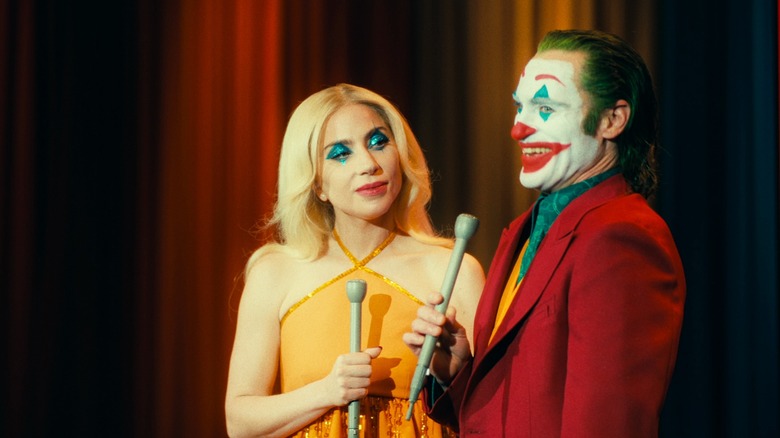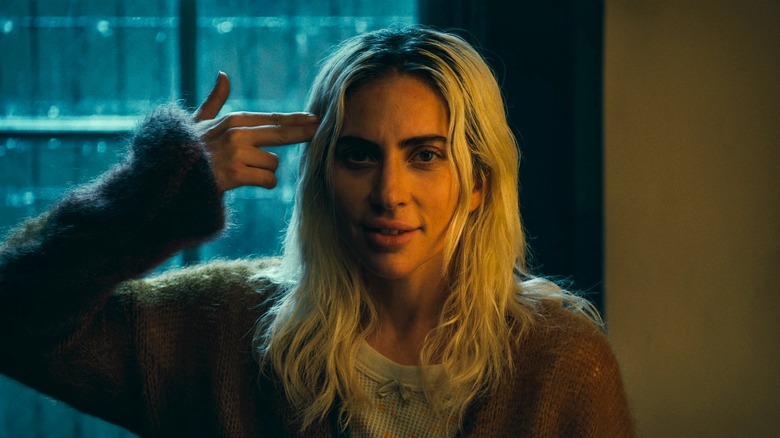How Director Todd Phillips Changed Harley Quinn & Harvey Dent For Joker 2
The arrest of Arthur Fleck (Joaquin Phoenix) in “Joker” instigated city-wide riots, with the crowd cheering for him as he stood atop a police car. Arthur’s influence and sway over the masses is haphazardly contained after he’s confined within Arkham State Hospital as a patient awaiting trial. In “Joker” director Todd Phillips’ upcoming sequel, “Joker: Folie à Deux,” Arthur’s stay at Arkham takes a musical turn after he falls in love with Harleen “Lee” Quinzel (Lady Gaga). As the couple embrace their newfound romance, the question of whether Arthur is of sound mind takes center stage in his criminal trial — where sanity is quite literally a death sentence.
The most oft-repeated Joker origin story comes from Alan Moore and Brian Bolland’s “Batman: The Killing Joke.” This tale reveals that he was once a failed stand-up comedian who got roped into a robbery and accidentally fell into a vat of chemicals, emerging with his old identity erased and replaced with the persona of Gotham’s Clown Prince. Arthur Fleck’s arc in “Joker” took the failed comedian concept from “The Killing Joke” and coupled it with Martin Scorsese influences like “The King of Comedy.” The film painted the character as more tragic and sympathetic than in the comics (perhaps a bit too much at times), with a heavy emphasis on pitch dark shades of grey and narrative unreliability.
Just like Arthur was given a backstory that both draws and departs from the comics, the characters of Harley Quinn and Harvey Dent have also undergone the Todd Phillips treatment, with quirks and backstories designed around this particular version of Gotham City. Both Harley and Harvey are at the beginning of their arcs here, where the drastic changes to their personalities are yet to happen, and the how being served up by “Joker: Folie à Deux” — at least, in part.
Joker 2 shows Harvey Kent and Harley Quinn through a ‘real-world lens’
In a pre-screening Q&A for “Joker: Folie à Deux” attended by /Film’s own Bill Bria, director Todd Phillips and screenwriter Scott Silver answered pertinent questions regarding Arthur’s newest arc in the upcoming film. Phillips also talked about the influences that helped shape his Harley Quinn and Harvey Dent, with their personalities molded to fit the tone and gravity of the world that Fleck lives in:
“First is really, we respect the comics; we get the comics. In Harley’s case, we watched animated series’. Of course, Margot Robbie is Harley Quinn. But when we run things through this film … Harvey Dent is a perfect example. It’s actually a simpler way of talking about what we did with Harley, which was really just put the real-world lens on it, and not that other movies didn’t, but run it through our Gotham.”
The grittiness of Gotham has been portrayed in varying degrees throughout the years, with some versions being tinted with a sense of gothic gloom and others emerging as stark cesspools of crime and corruption. Phillip’s Gotham feels like a place wholly devoid of empathy, with almost everyone adopting a callous, hyper-individualistic approach to existence that does not pause to comfort anyone in pain or need. However, there are glimpses of hope, like a young Harvey Dent (Harry Lawtey): an assistant D.A. involved in Fleck’s trial, who rightfully condemns his “depraved acts of violence” that triggered city-wide upheaval. Phillips cautioned fans against expecting a detailed origin story for Two-Face, Harvey Dent’s villain persona in the comics:
“Really the Harvey Dent you meet in here is not a huge part, but if you’re going to have a trial, why wouldn’t you have the assistant DA prosecuting Arthur Fleck who happens to be Harvey Dent? But it’s not about his … We don’t really reveal his dark side. We see a young Harvey Dent. I think by the end of the movie, I hope […] I think it’ll all come together for you, that kind of thing.”
“Joker: Folie à Deux” will hit theaters on October 4, 2024.















![Spider-Man’s Black Cat Joins The Avengers In New Marvel Comic [Exclusive Preview] Spider-Man’s Black Cat Joins The Avengers In New Marvel Comic [Exclusive Preview]](https://i2.wp.com/www.slashfilm.com/img/gallery/spider-mans-black-cat-joins-the-avengers-in-new-marvel-comic-exclusive-preview/l-intro-1735236299.jpg?w=300&resize=300,300&ssl=1)
Post Comment